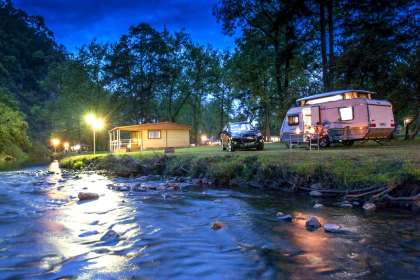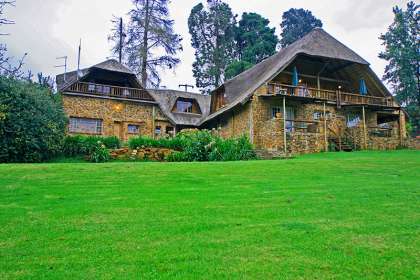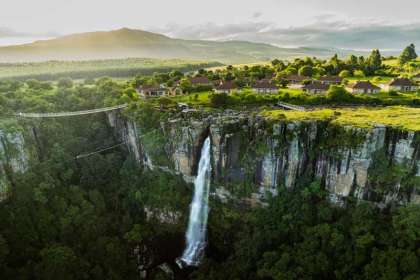Long Tom Pass
Long Tom Pass
In 1953 the pass was opened, and in some areas along the route, it featured various changes and slight deviations, though most of the pass remained unchanged. The major obstruction of cutting the pass, was the Drakensberg. In 1871, an order was issued by then President TF Burgers, that a road be constructed running over the mountains to the sea. The contract was awarded to Abraham Espag, and most of the work along the new route was undertaken using picks and shovels. The route was originally used by pioneer wagon drivers transporting goods from Mozambique to Lydenburg, and the first wagons to use the new road, arrived in Lydenburg from Delagoa Bay, now known as Maputo, in 1874. The road, which followed the route of the old hawepad in many places, carried travellers over much treacherous terrain, with steep hair pin bends and sudden drops, and many wagons were lost along the hazardous Devil's Knuckles. In the days of the old road, the area was extremely dangerous, inhabited by wild animals which roamed freely, combined with the threat of malaria carrying mosquitoes which made journies through the region both difficult and discouraging.
Today the area displays a rich and diverse in vegetation, and is home to species the likes of eucalyptus and pine trees which blanket the dramatic landscape as far as the eye can see. The LongTom Pass provides visitors with awesome views of the picturesque surrounds, which are dominated by the the peaks of Mount Anderson and Mauchsberg, which make for excellent attracions along the scenic drive.The pass which is used today, was opened on 22 July 1953. Sections of the old road are signposted along the new pass, which was tarred eleven years after being officially opened, in 1964. At Die Geut (the gutter), deep grooves can be seen, cut into in the slate by the wheels of the wagons as they slid down the steep gradient.
Also in the region is Misty Mountain, a two hundred and eighty hectare South African Natural Heritage Site situated on the spectacular Long Tom Pass. Misty Mountain boasts a unique setting, nestled amongst mountainous countryside, providing visitors with majestic views across the escarpment and into the lowveld. Misty Mountain serves as an ideal base from which to explore the Mpumalanga escarpment and the Kruger National Park. Activities in the Long Tom Pass area include trout fishing in dams and weirs with equipment available for hire, guided quad biking excursions , mountain biking, birding, hiking, and viewing of the magnificent natural features of the area.
Accommodation Near Long Tom Pass
Merry Pebbles Holiday Resort
Holiday Resort Accommodation in Kruger Park
7.6km from Long Tom PassMerry Pebbles Resort is situated on the banks of the Sabie River, 1 km from Sabie village. AA Highly Recommended self-catering accommodation, as well as 3 Star caravan and camping sites are available. …see more for bookings / enquiries and info.
The Sabie Town House
Bed & Breakfast Accommodation in Sabie, Kruger Park Area
9.1km from Long Tom PassGreg and Family offer guests a warm and friendly personal welcome to our lovely, distinctive home, constructed of river stone and local timber, peacefully situated overlooking the stunning natural beauty of the Sabie Gorge. …see more for bookings / enquiries and info.
Amani Boutique Hotel & Conference Centre
Hotel / Boutique Hotel Accommodation in Lydenburg
23km from Long Tom PassAmani is a dream come true, offering discerning guests a place in nature with amazing views on the mountains and valleys, as well as the Mpumalanga Parks Board dams. We are situated on the border of the town. …see more for bookings / enquiries and info.
Mogodi Lodge
Self Catering House, Cottage, Chalet Accommodation in Graskop
23.4km from Long Tom PassSuperbly situated just fifty metres from the Graskop Gorge Falls with a magnificent view over the Mpumalanga Lowveld. An ideal location for guests to enjoy the abundant natural beauty. …see more for bookings / enquiries and info.
Aqua Terra Guest House
Bed & Breakfast Accommodation in Lydenburg
24km from Long Tom PassAqua Terra means 'Water and Earth' in Latin, this is clearly portrayed as the Sterkspruit River flows along the outskirts of this one hectare property, amidst shady willow trees and rolling lawns. We do breakfast, lunch box and dinner on request and cater …see more for bookings / enquiries and info.
Sabaan Guest Farm and Event Venue
Self Catering House, Cottage, Chalet Accommodation in Hazyview
29.8km from Long Tom PassOur safe, family owned farm with scenic views, peace, and tranquillity - is centrally situated between Hazyview and Sabie, ideal to visit the Panorama Route, Kruger National Park and many more world known attractions in the area. …see more for bookings / enquiries and info.
 Long Tom Pass - Lydenburg, Escarpment, Mpumalanga ©
Long Tom Pass - Lydenburg, Escarpment, Mpumalanga © 







